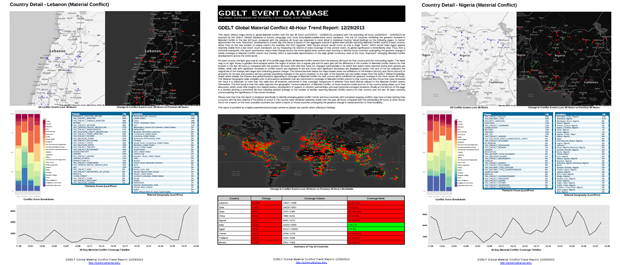UPDATE 2/6/2016: We are still publishing these files daily, but the list of world leaders is not currently being updated while we transition to our new system. You can still download them in the format (YYYY-MM-DD.pdf), they are generated each morning with the date of the prior day. For example, on 2/6/2016 the latest report would be found at the URL http://data.gdeltproject.org/dailytrendreport/GDELT_Trend_Report-2016-02-05.pdf
UPDATE 10/20/2015: Those interested in country stability reports may also find the GDELT Stability Dashboard API Stability Timeline to be of great interest and utility.
We’re tremendously excited to share the latest addition to GDELT, our new Global Daily Trend Reports, summarizing the latest developments and emerging trends in Material Conflict across the globe, delivering the world to your inbox each morning.
It’s been striking by how many requests we get for “big picture” visuals from GDELT, drawing together all of its data into simple visuals and reports that policymakers, NGOs, journalists, and others can understand that capture the overall macro-trends while being reasonably robust to noise. As a first step towards this, we’ve released a new prototype daily trends service that runs each morning and compares Material Conflict in the previous 48 hours around the globe to the preceding 48 hours and compiles a printable visual PDF report summarizing major developments. For the top 10 countries exhibiting the greatest increase towards Material Conflict over the past 48 hours, one-pager Country Detail briefings draw from both the GDELT event data and Global Knowledge Graph to produce maps, charts, and tables summarizing what’s going on, who’s involved, its context, and its significance.
In a departure from many other instability rankings, this report is based on changes in the volume of news coverage reporting on Material Conflict in a nation, rather than on the raw number of actual conflict events there. For example, the 2011 Egyptian Tahir Square protest would count as only a single “event,” which would make Egypt appear relatively stable from a raw event standpoint, but by measuring the volume of news coverage of that protest event, its global significance becomes immediately clear. Thus, from a technical standpoint, this report synthesizes macro-level change across the entire global news system each morning to identify those countries undergoing the greatest change in media attention to Material Conflict events there and thereby captures the global news media’s view on the most “important” changes.
This is a highly experimental prototype, so please use caution when utilizing its findings while we continue to develop it, but we hope this will serve as a useful tool to many and spur new research into how GDELT can be used for global trend detection and dashboarding.
You can access the archive of current reports, dating back to December 15, 2013, on the GDELT website, or subscribe to the Google Groups mailing list we set up for the reports to get the PDF report in your inbox each morning:
https://groups.google.com/forum/#!forum/gdelt-daily-global-trend-report—material-conflict
